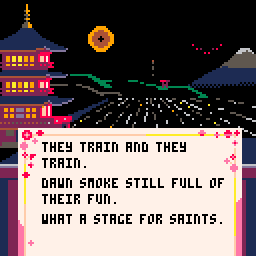
🕹️ Awards and fantasies
A dispatch on games for December from James
James is back to talk about what's happening in games this month


Released a few weeks ago, this PICO-8 game(...?) is super cute and chill, falling into the realm of cosy games perhaps. Get a random mix of words and build a haiku.
It does a wonderful job of introducing the conventions of writing a haiku, including the use of kigo, or seasonal words, as well as the short stanzas.
I made a couple, exported as GIFs. Nothing ground-breaking, but I had fun!

A cute, chill, pool-ball version of the enormously popular "Suika Game" which blew up on the Switch store here in Japan.
POOOOL was featured on the new and trending page, which is great to see. Good to know that there is space for cool lil games like this.
A new one from Johan Peitz, creator of Orb of Aeternum, a game featured in April's Sandbox Victory.
A fun, cosy solitaire game with a bunch of different game modes and unlockable card backs.
I've not actually played it, so I can't give it a proper review, but for PICO-8 of the month, this one stands out to me.
From the creator of The Stanley Parable and The Beginner’s Guide comes Wanderstop, a narrative-centric cozy game about change and tea."
I'm surprised at the announcement of this game from the creator of the Stanley Parable and Beginner's Guide as they are both incredibly unique and powerful experiences. That is to say – although I haven't played Wanderstop, knowing that it's a cosy game comes as a bit of a surprise considering the pedigree of the creator's previous games. But at the same time, I should make it clear that I'm not disappointed with the announcement. I'm really interested to see what did in the cosy game space!
Not a huge amount is known about it yet.
But apparently a combination of "Dota 2, Team Fortress 2, Overwatch, Valorant, Smite, Orcs Must Die" which is a hell of a lot of content/genres to squeeze into a single game.
As someone that has never played Team Fortress, Unreal Tournament or any of the major team shooters, this game is quite outside of my play style, but in the world of eSports which revolves around such games (as well as MOBAs of course) I can imagine this being big news for a lot of people.
It doesn't seem to be anywhere near completion, so news will probably continue to be leaked over the coming months.
Seen on Twitter, this game looks like a wild mix of Mad Max and Destruction Derby.
Last month I enjoyed Animal Well, and cleared it quite quickly. I played with my son and we worked together to figure out where we should go and what we should do. I know there is a bunch of extra stuff we can do (collect eggs, find the final items, etc.) but I'm not sure I want to spend my time perfecting the game (and using a bunch of guides to help me). As such, we're going to leave the game here and move on to something new for June.
Speaking to my son this morning, we have decided to give a Dragon Quest game a try. Neither of us have played a DQ, and so to fill that void of our gaming literacy, we have decided to pick up DQ5 as it comes highly recommended by DQ fans.
How are we going to play? Well, as the title of this section states: Delta on iOS, mirrored to the TV in our lounge.
Although not a new release this month, this is the first month I'm writing about it.
In May, I played a little-known Japanese-only horror game on the SNES called Otogiriso (which is a kind of visual novel) using Delta, and the experience was great.
Some of the charms of Delta:
So, this month, I'm going to dive into DQ5 (the DS version) using Delta. I'll report back at the end of the month regarding how it's going!
For the second game for this month's "In Rotation," I'm going to bring the focus to my teaching! Yes, this is a game that I'm playing (or at least, moderating) in one of my English classes at Meiji University.
I (and my students) have really fallen in love with this game and have played it for three weeks in a row.
The game has replaced Two Rooms and a Boom as my default game for large groups of students. That is to say, I'm still very much attached to Two Rooms, as this game was at the core of my TBLT gaming methodology from the beginning. However, I'm finding it harder to justify using Two Rooms recently. It has some... flaws:
In Ico, you control a young boy named... Ico, who was born with horns. (At the time, I thought it was a Viking helmet). He is imprisoned in a remote castle by his village as a sacrifice. (I'm not sure exactly why though). Ico manages to escape his cell and meets Yorda, a mysterious girl who is also trapped in the castle. Together, they must navigate through the castle's puzzles and avoid shadowy creatures that try to capture Yorda.
The main gameplay elements revolve around solving environmental puzzles, platforming, and protecting Yorda as they seek to escape the castle.
This is a point made tin the Jason Geller video, too. The fact that the castle is the main adversary in the game. The castle is one of the main characters.
After watching this wonderful video by Jason Geller, I decided to pick up Ico again to relive the experience.
I've not played it since it came out originally in 2001. At that time I didn't own a PS2, and so played it in turns around a friend's house.
I remember vividly that we both felt that Ico was something different. It had to do with the role that you take on as the main character. How different it felt to have a dependent to look after throughout the whole game. How weird it was to not have such minimal dialogue. How interesting the AI felt in Yorda (the mute girl that we must protect). How bizarre the whole plot was.
Ico was a game that made us go "Wow, Japan does things differently" but in a good way, not in a "Wow, Japan is weird as hell" way that is so often the case with games like Mr. Mosquito, or Incredible Crisis. More like, wow, as in Katamari Damacy.
Definitely worth a play IMO.
And if you like it, check out the other games by this excellent studio:
We need to talk about Poki.com!
I found out about DRIFTWAVE from this tweet by Janie Rowan, the game's creator.
Poki is a site that hosts 100s of mini-games that are of surprisingly high quality (like DRIFTWAVE). And there are so many! It's like the all-you-can-eat buffet of online gaming. Want to solve puzzles? They've got you. Craving some action? Oh yeah, it's there. Feeling sporty? You bet!
It works on mobile, too; so, if you're like me and have little kids that play games on Poki, you can limit their time on the site.
All free-to-play with adverts sprinkled in here and there.
Some other notable games on there: